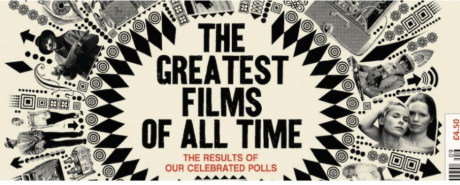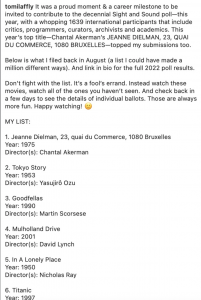The 2022 Sight & Sound poll popped earlier this afternoon, and we all knew what the results would reflect, right? Not so much with films directed by older white guys (especially OWG directors with a somewhat dicey or shady reputation), and up with films directed by women and POCS. And so Chantal Akerman‘s Jeanne Dielman, 23, quai du Commerce, 1080 Bruxel, a 201-minute film about duty, survival, sex working, regimentation and repetition, and which ends with a “john” getting stabbed in the throat with a pair of scissors, was named #1.
In other words, (a) down with the insensitive asshole patriarchy, (b) up with chopped onions carefully mashed into ground beef, and (c) hooray for Delphine Seyrig finally having an orgasm.
In 2012 Jeanne Dielman ranked #36 on the BFI list…fine. But how did it manage to suddenly vault up to the #1 position? Admired films tend to move up gradually, no? It feels to some of us like Dielman won because of an organized campaign among feminist-minded critics. If Dielman had landed in the 10th or 12th spot in the 2012 poll, today’s win would have seemed more of a natural thing. But to go from 36th place a decade ago to #1 in ’22? It seems to me like the fix was in.

You can’t argue or complain with the BFI critics, who are primarily a bunch of highbrow snoots trying to out-snoot each other.
If you ask me the BFI Directors Greatest Films of All Time list is a lot more grounded and sensible.
So 60th-ranked Moonlight has edged out Casablanca (#61), Goodfellas (#62) and The Third Man (#63). I’ve seen all four, and I’m telling you straight from the shoulder that there’s no way Moonlight deserves, deliberately or haphazardly, to be ranked above the other three…NO WAY ON GOD’S GREEN EARTH.
Alfred Hitchcock‘s Vertigo is now ranked second, and I honestly thought it would take a bigger hit than that. I figured the legend of Hitch having allegedly made Tippi Hedren‘s life hell during the making of The Birds and especially Marnie…okay, let’s drop it, but I’m slightly surprised.
Three indisputably great 20th Century films about conflicted white males dealing with disillusionment and corruption — David Lean’s Lawrence of Arabia (’62), Roman Polanski’s Chinatown (’74) and Sam Peckinpah’s The Wild Bunch (’69) — were booted off the critics’ list of the top 100. Polanski had to pay for his sexual indiscretions of the ’70s and ’80s, I suppose, and Peckinpah had to be banned for his notorious misogyny. But why did the saga of T.E. Lawrence get the shaft? What exactly did Lean or Lawrence do to earn the heave-ho? Was it the old arrogant British imperialism thing, or the fact that women are barely seen and certainly not heard seen in that classic desert epic?
1. “Jeanne Dielman, 23, quai du Commerce, 1080 Bruxel” (Chantal Akerman, 1975)
2. “Vertigo” (Alfred Hitchcock, 1958)
3. “Citizen Kane” (Orson Welles, 1941)
4. “Tokyo Story” (Ozu Yasujiro, 1953)
5. “In the Mood for Love, Wong Kar-wai, 2001)
6. “2001: A Space Odyssey” (Stanley Kubrick, 1968)
7. “Beau travail” (Claire Denis, 1998)
8. “Mulholland Dr.” (David Lynch, 2001)
9. “Man with a Movie Camera” (Dziga Vertov, 1929)
10. “Singin’ in the Rain” (Stanley Donen and Gene Kelly, 1951)
11. “Sunrise: A Song of Two Humans” (F.W. Murnau, 1927)
12. “The Godfather” (Francis Ford Coppola, 1972)
13. “La Règle du Jeu” (Jean Renoir, 1939)
14. “Cléo from 5 to 7” (Agnès Varda, 1962)
15. “The Searchers” (John Ford, 1956)
16. “Meshes of the Afternoon” (Maya Deren and Alexander Hammid, 1943)
17. “Close-Up” (Abbas Kiarostami, 1989)
18. “Persona” (Ingmar Bergman, 1966)
19. “Apocalypse Now” (Francis Ford Coppola, 1979)
20. “Seven Samurai” (Akira Kurosawa, 1954)
21. (TIE) “The Passion of Joan of Arc” (Carl Theodor Dreyer, 1927)
21. (TIE) “Late Spring” (Ozu Yasujiro, 1949)
23. “Playtime” (Jacques Tati, 1967)
24. “Do the Right Thing” (Spike Lee, 1989)
25. “Au Hasard Balthazar” (Robert Bresson, 1966)
25. The Night of the Hunter” (Charles Laughton, 1955)
27. “Shoah” (Claude Lanzmann, 1985)
28. “Daisies” (Věra Chytilová, 1966)
29. “Taxi Driver” (Martin Scorsese, 1976)
30. “Portrait of a Lady on Fire” (Céline Sciamma, 2019)
31. “Mirror” (Andrei Tarkovsky, 1975)
31. “8½” (Federico Fellini, 1963)
31. “Psycho” (Alfred Hitchcock, 1960)
34. “L’Atalante” (Jean Vigo, 1934)
35. “Pather Panchali” (Satyajit Ray, 1955)
36. “City Lights” (Charlie Chaplin, 1931)
36. “M” (Fritz Lang, 1931)
38. “À bout de souffle” (Jean-Luc Godard, 1960)
38. “Some Like It Hot” (Billy Wilder, 1959)
38. “Rear Window” (Alfred Hitchcock, 1954)
41. “Bicycle Thieves” (Vittorio De Sica, 1948)
41. “Rashomon” (Akira Kurosawa, 1950)
43. “Stalker” (Andrei Tarkovsky, 1979)
43. “Killer of Sheep” (Charles Burnett, 1977)
45. “North by Northwest” (Alfred Hitchcock, 1959)
45. “The Battle of Algiers” (Gillo Pontecorvo, 1966)
45. “Barry Lyndon” (Stanley Kubrick, 1975)
48. “Wanda” (Barbara Loden, 1970)
48. “Ordet” (Carl Theodor Dreyer, 1955)
50. “The 400 Blows” (François Truffaut, 1959)
50. “The Piano” (Jane Campion, 1992)
52. “News from Home” (Chantal Akerman, 1976)
52. “Fear Eats the Soul” (Rainer Werner Fassbinder, 1974)
54. “The Apartment” (Billy Wilder, 1960)
54. “Battleship Potemkin” (Sergei Eisenstein, 1925)
54. “Sherlock Jr.” (Buster Keaton, 1924)
54. “Le Mépris” (Jean-Luc Godard 1963)
54. “Blade Runner” (Ridley Scott 1982)
59. “Sans soleil” (Chris Marker 1982)
60. “Daughters of the Dust” (Julie Dash 1991)
60. “La dolce vita” (Federico Fellini 1960)
60. “Moonlight” (Barry Jenkins 2016)
63. “Casablanca” (Michael Curtiz 1942)
63. “GoodFellas” (Martin Scorsese 1990)
63. “The Third Man” (Carol Reed 1949)
66. “Touki Bouki (Djibril Diop Mambéty 1973)
67. “The Gleaners and I” (Agnès Varda 2000)
67. “Metropolis” (Fritz Lang 1927)
67. “Andrei Rublev” (Andrei Tarkovsky 1966)
67. “The Red Shoes” (Michael Powell & Emeric Pressburger 1948)
67. “La Jetée” (Chris Marker 1962)
72. “My Neighbour Totoro” (Miyazaki Hayao 1988)
72. “Journey to Italy” (Roberto Rossellini 1954)
72. “L’avventura” (Michelangelo Antonioni 1960)
75. “Imitation of Life” (Douglas Sirk 1959)
75. “Sansho the Bailiff” (Mizoguchi Kenji 1954)
75. “Spirited Away” (Miyazaki Hayao 2001)
78. “A Brighter Summer Day” (Edward Yang 1991)
78. “Sátántangó” (Béla Tarr 1994)
78. “Céline and Julie Go Boating” (Jacques Rivette 1974)
78. “Modern Times “(Charlie Chaplin 1936)
78. “Sunset Blvd.” (Billy Wilder 1950)
78. “A Matter of Life and Death” (Michael Powell & Emeric Pressburger 1946)
84. “Blue Velvet” (David Lynch 1986)
84. “Pierrot le fou” (Jean-Luc Godard 1965)
84. “Histoire(s) du cinéma” (Jean-Luc Godard 1988-1998)
84. “The Spirit of the Beehive” (Victor Erice, 1973)
88. “The Shining” (Stanley Kubrick, 1980)
88. “Chungking Express” (Wong Kar Wai, 1994)
90. “Madame de…” (Max Ophüls, 1953)
90. “The Leopard” (Luchino Visconti, 1962)
90. “Ugetsu” (Mizoguchi Kenji, 1953)
90. “Parasite” (Bong Joon Ho, 2019)
90. “Yi Yi” (Edward Yang, 1999)
95. “A Man Escaped” (Robert Bresson, 1956)
95. “The General” (Buster Keaton, 1926)
95. “Once upon a Time in the West” (Sergio Leone, 1968)
95. “Get Out” (Jordan Peele, 2017)
95. “Black Girl” (Ousmane Sembène, 1965)
95. “Tropical Malady” (Apichatpong Weerasethakul, 2004)
From N.Y. Times coverage:














